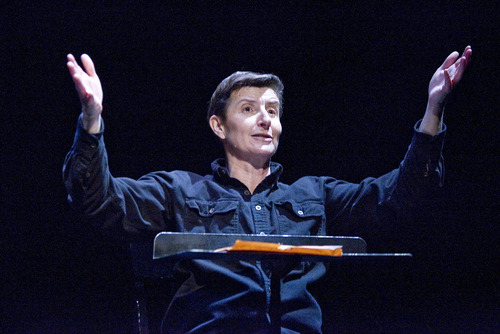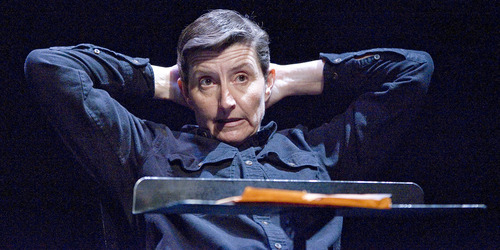This is an archived article that was published on sltrib.com in 2013, and information in the article may be outdated. It is provided only for personal research purposes and may not be reprinted.
What does it mean to be masculine or feminine? Is it mostly biologically determined? Is it largely culturally defined and imposed? What happens to your sense of self when you feel one way on the inside but look the opposite way on the outside?
These are some of the provocative questions posed by Matthew Ivan Bennett's "Eric(a)," making its world premiere at Plan-B Theatre Company.
Bennett gives the play the somewhat artificial setting of a paper entitled "Living Trans: An Intellectual Defense of Trans Experience" that Eric — who is transitioning from female to male — is presenting at a transgender meeting.
What keeps "Eric(a)" from lapsing into an intellectual exercise or psychological study are the vivid life experiences Eric shares with us, often colored by his ironic sense of humor—and the powerhouse performance of Teresa Sanderson.
"Living trans, you need confidence," Eric confides to us, and that is the major quality he lacks. "I spent 50 years hiding in a woman's clothes. I don't know how to do the man thing." Most people don't think about the implications of exchanging a female life for a male one. How does a married mother with two daughters turn her back on that life and start a new one as a single man? In essence, Eric has painted himself into a corner: he can no longer live as a woman, but he doesn't know how to live as a man.
His situation becomes more stressful when he meets a woman he wants to have a relationship with. "I feel seen when I'm with her. I feel solid," he tells us. Ironically, Addie is a gynecologist, and she is also attracted to him. "Why do I feel I can completely trust you?" she asks him. How can he tell her his secret, and what impact will it have? It is also interesting to consider how much Addie's comfortable feeling may stem from the 50 years of behavior and habits Eric acquired living as a woman. To some extent, we are all androgynous creatures.
Bennett's play asks even deeper questions. "I don't know what makes me me," Eric tells us. What constitutes our identity, and how is it shaped? And finally the play address our need to love and be loved. Eric says poignantly, "There is a person in here who isn't male or female, and it doesn't want to be alone."
Sanderson's performance is extraordinary, from her agitated, nervous entrance from the audience—a nice touch by director Jerry Rapier— to the sometimes humiliating anecdotes from her conflicted life as a woman. Exposing the depth of her self-doubt and insecurity, Sanderson is in total physical and emotional control of her character. Like a frightened deer, she self-consciously looks at the floor, then intimately locks eyes with the audience to reveal her alternating elation and confusion. Her mix of masculine and feminine mannerisms embodies Eric's uncertain fusion of past and present.
Rapier's stark, simple staging and Jesse Portillo's harsh spotlighting focus us firmly on Eric and his dilemma. But one longs for a bit more color and context in the setting. Cheryl Ann Cluff's sound design is too subtle to be heard.
In his notes for the play, Bennett says, "…Eric wants love. He wants to be seen by others as he sees himself. Just like the rest of us." "Eric(a)" builds a bridge between one person's story and a basic human quest: to become the person we truly want to be.
Plan-B's Eric(a)
P Teresa Sanderson's passionate, perceptive performance puts a personal face on some universal human questions.
When • Reviewed on Feb. 28. Continues Thursday and Friday at 8 p.m., Saturday at 4 and 8 p.m., and Sunday at 2 p.m. through March 10
Where • Studio Theatre at the Rose Wagner Performing Arts Center, 138 West Broadway, Salt Lake City.
Tickets • $20, $10 for students. Call 355-ARTS or visit http://www.arttix.org for tickets and http://www.planbtheatre.org for more information.
Running time • 75 minutes (no intermission)





